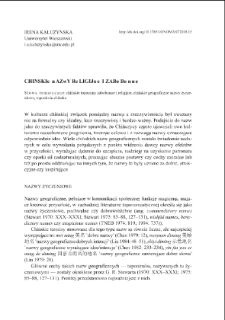- Search in all Repository
- Literature and maps
- Archeology
- Mills database
- Natural sciences
Advanced search
Advanced search
Advanced search
Advanced search
Advanced search

Object
Title: Chińskie nazwy religijne i zabobonne
Publisher:
Instytut Języka Polskiego Polskiej Akademii Nauk
Place of publishing:
Description:
Type of object:
Abstract:
In the Chinese culture the relationship between the name and the reality was predominantly regardedneither as formal nor ideal, but as real and very important. The approach to names as to real facts causedthat the Chinese very often expressed their culture-oriented desires by deliberately forming names forthe idea they wanted them to symbolize. Many geographical names have been consciously bestowed inorder to create a good (from the point of view of the name-giver) effect in the future. Such names aregenerally termed as wishful names, commendatory names or benedictory names. Among them, on thebasis of the Chinese place-name material, it is possible to distinguish several different groups: auspiciousnames, religious and superstitious names, eulogizing names and pacifying names. This paperbriefly analyses Chinese names connected with three great religions in China (Confucianism, Taoism,Buddhism) and superstitious names connected with the belief in supernatural forces, gods and goodomens.
Start page:
End page:
Detailed Resource Type:
Format:
Resource Identifier:
Language:
Rights:
Prawa zastrzeżone - dostęp nieograniczony
Access:
Object collections:
- Digital Repository of Scientific Institutes > Partners' collections > Institute of Polish Language PAS > Filds of science
- Digital Repository of Scientific Institutes > Partners' collections > Institute of Polish Language PAS > Filds of science > Humanities
- Digital Repository of Scientific Institutes > Partners' collections > Institute of Polish Language PAS > Filds of science > Humanities > Linguistics
- Digital Repository of Scientific Institutes > Partners' collections > Institute of Polish Language PAS > Filds of science > Humanities > Linguistics > Onomastics
- Digital Repository of Scientific Institutes > Partners' collections > Institute of Polish Language PAS > Books
- Digital Repository of Scientific Institutes > Literature > Books/Chapters
Last modified:
Oct 2, 2020
In our library since:
Jan 20, 2020
Number of object content downloads / hits:
683
All available object's versions:
https://rcin.org.pl./publication/133871
Show description in RDF format:
Show description in RDFa format:
Show description in OAI-PMH format:
| Edition name | Date |
|---|---|
| Chińskie nazwy religijne i zabobonne / Kałużyńska, Irena | Oct 2, 2020 |

 INSTYTUT ARCHEOLOGII I ETNOLOGII POLSKIEJ AKADEMII NAUK
INSTYTUT ARCHEOLOGII I ETNOLOGII POLSKIEJ AKADEMII NAUK
 INSTYTUT BADAŃ LITERACKICH POLSKIEJ AKADEMII NAUK
INSTYTUT BADAŃ LITERACKICH POLSKIEJ AKADEMII NAUK
 INSTYTUT BADAWCZY LEŚNICTWA
INSTYTUT BADAWCZY LEŚNICTWA
 INSTYTUT BIOLOGII DOŚWIADCZALNEJ IM. MARCELEGO NENCKIEGO POLSKIEJ AKADEMII NAUK
INSTYTUT BIOLOGII DOŚWIADCZALNEJ IM. MARCELEGO NENCKIEGO POLSKIEJ AKADEMII NAUK
 INSTYTUT BIOLOGII SSAKÓW POLSKIEJ AKADEMII NAUK
INSTYTUT BIOLOGII SSAKÓW POLSKIEJ AKADEMII NAUK
 INSTYTUT CHEMII FIZYCZNEJ PAN
INSTYTUT CHEMII FIZYCZNEJ PAN
 INSTYTUT CHEMII ORGANICZNEJ PAN
INSTYTUT CHEMII ORGANICZNEJ PAN
 INSTYTUT FILOZOFII I SOCJOLOGII PAN
INSTYTUT FILOZOFII I SOCJOLOGII PAN
 INSTYTUT GEOGRAFII I PRZESTRZENNEGO ZAGOSPODAROWANIA PAN
INSTYTUT GEOGRAFII I PRZESTRZENNEGO ZAGOSPODAROWANIA PAN
 INSTYTUT HISTORII im. TADEUSZA MANTEUFFLA POLSKIEJ AKADEMII NAUK
INSTYTUT HISTORII im. TADEUSZA MANTEUFFLA POLSKIEJ AKADEMII NAUK
 INSTYTUT JĘZYKA POLSKIEGO POLSKIEJ AKADEMII NAUK
INSTYTUT JĘZYKA POLSKIEGO POLSKIEJ AKADEMII NAUK
 INSTYTUT MATEMATYCZNY PAN
INSTYTUT MATEMATYCZNY PAN
 INSTYTUT MEDYCYNY DOŚWIADCZALNEJ I KLINICZNEJ IM.MIROSŁAWA MOSSAKOWSKIEGO POLSKIEJ AKADEMII NAUK
INSTYTUT MEDYCYNY DOŚWIADCZALNEJ I KLINICZNEJ IM.MIROSŁAWA MOSSAKOWSKIEGO POLSKIEJ AKADEMII NAUK
 INSTYTUT PODSTAWOWYCH PROBLEMÓW TECHNIKI PAN
INSTYTUT PODSTAWOWYCH PROBLEMÓW TECHNIKI PAN
 INSTYTUT SLAWISTYKI PAN
INSTYTUT SLAWISTYKI PAN
 SIEĆ BADAWCZA ŁUKASIEWICZ - INSTYTUT TECHNOLOGII MATERIAŁÓW ELEKTRONICZNYCH
SIEĆ BADAWCZA ŁUKASIEWICZ - INSTYTUT TECHNOLOGII MATERIAŁÓW ELEKTRONICZNYCH
 MUZEUM I INSTYTUT ZOOLOGII POLSKIEJ AKADEMII NAUK
MUZEUM I INSTYTUT ZOOLOGII POLSKIEJ AKADEMII NAUK
 INSTYTUT BADAŃ SYSTEMOWYCH PAN
INSTYTUT BADAŃ SYSTEMOWYCH PAN
 INSTYTUT BOTANIKI IM. WŁADYSŁAWA SZAFERA POLSKIEJ AKADEMII NAUK
INSTYTUT BOTANIKI IM. WŁADYSŁAWA SZAFERA POLSKIEJ AKADEMII NAUK




































